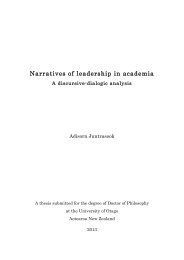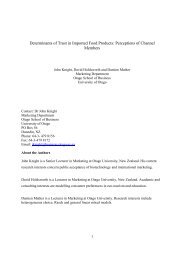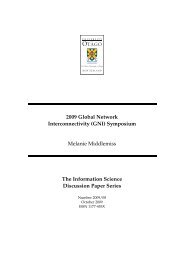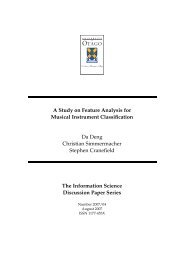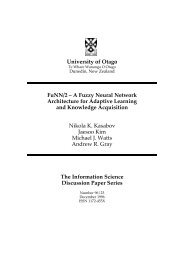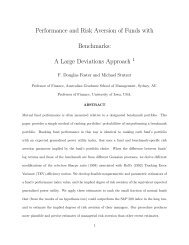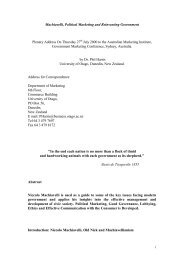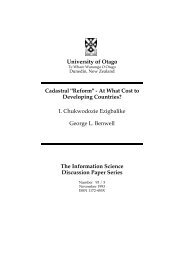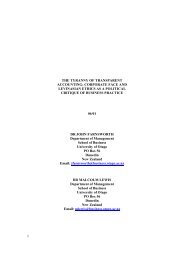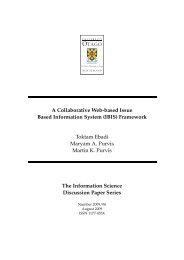Where is R2P grounded in international law? Anne-Marie Judson A ...
Where is R2P grounded in international law? Anne-Marie Judson A ...
Where is R2P grounded in international law? Anne-Marie Judson A ...
You also want an ePaper? Increase the reach of your titles
YUMPU automatically turns print PDFs into web optimized ePapers that Google loves.
were found to be a part of war crimes even though there were references to crimes<br />
aga<strong>in</strong>st humanity. The research showed that the Nuremberg and Tokyo Trials had<br />
failed to prosecute crimes aga<strong>in</strong>st humanity on their own. The Secretary-General on<br />
sett<strong>in</strong>g up the Tribunals of Rwanda and the former Yugoslavia could not d<strong>is</strong>t<strong>in</strong>gu<strong>is</strong>h<br />
crimes aga<strong>in</strong>st humanity from war crimes or genocide. The United Nations at the<br />
time avoided add<strong>in</strong>g crimes aga<strong>in</strong>st humanity as a reason for sett<strong>in</strong>g up the Tribunals.<br />
Th<strong>is</strong> research showed that crimes aga<strong>in</strong>st humanity on its own could not be used for<br />
an <strong>in</strong>tervention but must be additional to war crimes and or genocide to be <strong>in</strong>cluded<br />
<strong>in</strong> <strong>in</strong>ternational customary <strong>law</strong>.<br />
Chapter 4 identified that certa<strong>in</strong> rights could be derogated from under the state of<br />
emergency and the International Covenant of Civil and Political Rights (1966).<br />
Detailed research was undertaken <strong>in</strong> th<strong>is</strong> area to assess the prov<strong>is</strong>ions and the extent<br />
to which rights could be derogated from. Th<strong>is</strong> research showed the pr<strong>in</strong>cipal reason<br />
why a state derogated from rights was because of a terror<strong>is</strong>t threat or a public upr<strong>is</strong><strong>in</strong>g<br />
aga<strong>in</strong>st the state. It also showed that states regularly breached or violated the<br />
prov<strong>is</strong>ions associated with the Covenant plac<strong>in</strong>g civilians at further r<strong>is</strong>k of abuse.<br />
It also has shown that the <strong>in</strong>ternational community <strong>is</strong> not legally entitled to <strong>in</strong>tervene<br />
<strong>in</strong> a state that <strong>is</strong> abus<strong>in</strong>g these rights unless the abuses constituted a war crime and or<br />
genocide. Th<strong>is</strong> showed that some rights could be abused legally <strong>in</strong> <strong>in</strong>ternational <strong>law</strong> so<br />
long as the exigencies of the situation pers<strong>is</strong>ted and the government was under threat.<br />
The research clarified that under certa<strong>in</strong> prov<strong>is</strong>ions civil and political rights can be<br />
derogated from and th<strong>is</strong> was exceptional to all other <strong>in</strong>ternationally b<strong>in</strong>d<strong>in</strong>g treaties<br />
on the protection of civilian rights dur<strong>in</strong>g a time of civil peace. <strong>R2P</strong> was found to be<br />
outside of these derogations <strong>in</strong> a state of emergency, civilian rights were found to be<br />
non-ex<strong>is</strong>tent and unprotected even by the <strong>in</strong>ternational community unless it could be<br />
proved that the state was <strong>in</strong> fact <strong>in</strong> a conflict with another party. The party had to be<br />
clearly identified. Th<strong>is</strong> ra<strong>is</strong>ed many other questions.<br />
F<strong>in</strong>ally the entire thes<strong>is</strong> showed that <strong>R2P</strong> <strong>is</strong> not a new idea nor does it contribute new<br />
material to already ex<strong>is</strong>t<strong>in</strong>g <strong>in</strong>ternational <strong>law</strong>s and norms. The idea has been at the<br />
heart of the United Nations General Assembly d<strong>is</strong>cussions s<strong>in</strong>ce its second meet<strong>in</strong>g <strong>in</strong><br />
1945, each state agreed to refra<strong>in</strong> from aggression and <strong>in</strong>terference <strong>in</strong>to other states<br />
<strong>in</strong>ternal affairs.<br />
<br />
127



